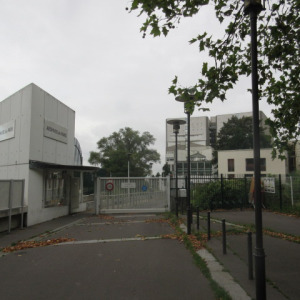Every month we discuss one archive which has been particularly useful for a French historian. This month Dr Chris Millington (Swansea) talks us through the archives de Paris.
During the summer I made several trips to the Archives de Paris. It was the first time that I had visited these archives since 2006 when I first began researching in France. The archives are located at 18 Bd Sérurier. They are open between 9.30am and 5pm, Tuesday-Saturday – note that they are closed on Monday. The building is in the north east of the city in the Lilas area. When you come out of the metro (Porte des Lilas, line 11), cross over the road and the tramlines and start to walk down the hill. The archives are on the right, and are clearly signposted (though I managed to walk right past them twice…).
As I walked through the outer gate to the main building I couldn’t help but think of The Walking Dead, given the overgrown path and the seemingly abandoned hut on the right, covered in climbing plants. I did however notice that there are picnic benches outside – for lunch in the sun – and a family of sheep living in a fenced-off area on the left (part of the Parisian council’s attempts at ‘eco-pâturage’ – or maintaining lawns and grassland with ‘natural’ lawnmowers).
When you arrive, go to the reception desk; this is where you register for a card. You’ll need ID with you to do so – my driving licence was suitable. Once you have your card, the locker room is to the left of the reception desk. The usual rules apply for what you can and cannot take into the archive (no pens but laptops and cameras are allowed). The lockers are secured using a combination lock, so there’s no scrabbling about for a 1 Euro piece. Each time you revisit the archives you much ‘check in’ at the reception desk.
The reading room is upstairs. Within the reading room, there is an information desk from which you take a seat number. The inventories are located on the shelves near the window. When I first arrived at the archives I spoke to staff at the information desk about my research. The staff were very helpful as I explained that it was my first visit to the Archives de Paris, and that I didn’t know what to do (thinking back, I could have phrased this better; I think it sounded like I didn’t have the first clue about archival research). One of the staff showed me to the inventories and demonstrated how to order a document at the computers near the information desk. Once your documents have arrived, they can be retrieved from the guichet much as one would do so at the Archives Nationales.
The staff at the desk really did go beyond the call of duty when it came to ordering my documents. It seems that some documents (I’m not sure which ones, so you should ask when you arrive) are stored off-site; they are only retrieved twice a week. This can present problems if you are a researcher in Paris for a short amount of time. However, I was told that the staff are used to dealing with foreign researchers on fleeting trips to Paris, and so I was able to make a special request for the documents to be delivered the next day.
As far as I could tell, you have permission to photograph documents (though admittedly I wasn’t consulting any that required special permission – the dreaded dérogation). In fact, when I asked a member of staff if photography was allowed, he didn’t seem to understand why I was even asking!
Overall, my experience at the Archives de Paris was a good one, save for my usual complaint – no cafe! There is a hot drinks machine in the foyer, with three tables at which you can stand and drink them. But there is nowhere to buy food (except the bakery on the square opposite the metro) and other than the seating outside, there is nowhere to sit and eat. But when the sun is out, you could be in worse places than eating with the sheep outside the Archives de Paris.
This blog post was originally posted on Chris’s own blog ( French History Online.French History Online )- which contains blogs on archives, as well as on sources, teaching and researching French history and events in France and is a great resource for everyone interested in French and modern history.





